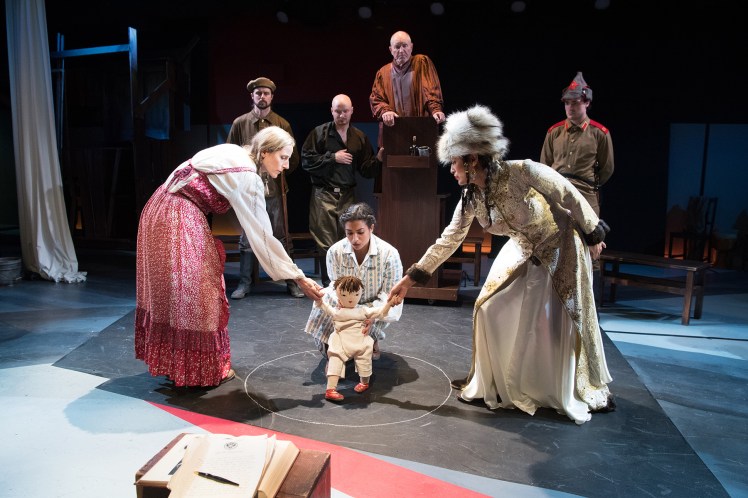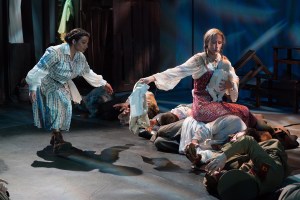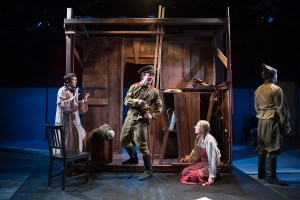
Set up as a play-within-a-play, the action of Bertolt Brecht’s The Caucasian Chalk Circle, currently playing at Antaeus Theatre Company in Los Angeles, begins in the lobby. Before anyone takes their seats, the actors mingle amongst the waiting crowd to set the stage, playing two groups of farmers debating who deserves to own and rehabilitate a section of land that has been devastated by World War II. In order to settle the argument and prove their point, the people on one side of the disagreement decide to reenact the famous parable of the chalk circle. What follows is a powerful tale of loyalty, class, and injustice that hits as hard today as it likely did when it was originally written in 1944.

Directed by Stephanie Shroyer, the satirical play-within-the-play is set in the Caucasus Mountains in the country of Georgia. After a civil war uprising that results in the Governor’s beheading, his wife (Claudia Elmore) must flee the burning city, but she spends so much time focused on which items of clothing to save that she “inadvertently” leaves her infant child, Michael, behind. Grusha (Liza Seneca), a kitchen maid, finds the child, and although the other servants urge her to leave him behind, noting that a child of his lineage will only bring her trouble, she cannot bring herself to abandon him. She escapes into the mountains with the baby, the beginning of a long and arduous journey. Years later, the Governor’s wife resurfaces, and she wants her long-missing child back.

In act two, the action flashes back and shows the audience what occurred in the city Grusha abandoned after she fled. Azdak (Steve Hofvendahl), a peasant with revolutionary ideas, is elected Judge after a series of curious happenstances. At first, his rulings seem completely nonsensical, but when he must decide if Michael should be returned to the birth mother who abandoned him or remain with Grusha, who has risked everything to love and protect him, it becomes clear there may be a method to Azdak’s madness. The play also has musical elements, with the cast often singing and playing instruments to set the scene and enhance the quirky, satirical tone. While Brecht did write some music himself for early productions, there is no officially published score, so the Antaeus company created the music they perform in this version. Sound designer Jeff Gardner deftly combines the ominous, minor key tunes with the instruments and dialogue, filling out the small space nicely.

The cast of 16 all plays multiple roles, working as a unit to perform the parable. When Grusha and her long-lost lover, Simon (Michael Khachanov) are separated by a river, that river is comprised of the bodies of the other members of the ensemble, lying on the stage. The versatile set (Frederica Nascimento), which consists primarily of small, movable elements, is constantly transformed, and the actors are always moving their bodies in interesting ways. When a character mimes pouring water into a bath, another actor pours actual water into a bucket nearby, creating the appropriate sounds. Baby Michael is portrayed only by a crude doll, adding a layer of levity even when the stakes are high.

Brecht referred to the style of this show as “epic theatre”—plays that are meant to teach a lesson and promote social change while also entertaining. This contemporary translation by playwright Alistair Beaton presents various ideas about class, justice, and corruption, urging the audience to perform their own version of the chalk circle test by examining two sides of a story and deciding who is in the right. This Antaeus production is lively and spirited, injecting charm and detail into every scene. As in most parables, the story and its characters are often simplified—for example, Grusha encounters multiple predatory men on her journey, an unfortunately common trope.

The cast is exceptional in this fast-moving and demanding piece, easily switching between characters and scenes, often while singing and playing instruments such as the accordion. Hofvendahl really shines in the second act as the witty Azdak takes center stage, and Seneca is affecting as Grusha, whose heart is always in the right place. At the core of the drama is the question of how we can really decide what is best for someone else, or who has a rightful claim to a person or a thing, and the answer presented is a thoughtful one that can be applied to many modern situations.
The Caucasian Chalk Circle runs at the Kiki & David Gindler Performing Arts Center in Glendale through August 26th. Performances are Mondays, Fridays, and Saturdays at 8pm and Sundays at 2pm. The running time is two and a half hours, including one intermission. Tickets are $35 and can be purchased here.